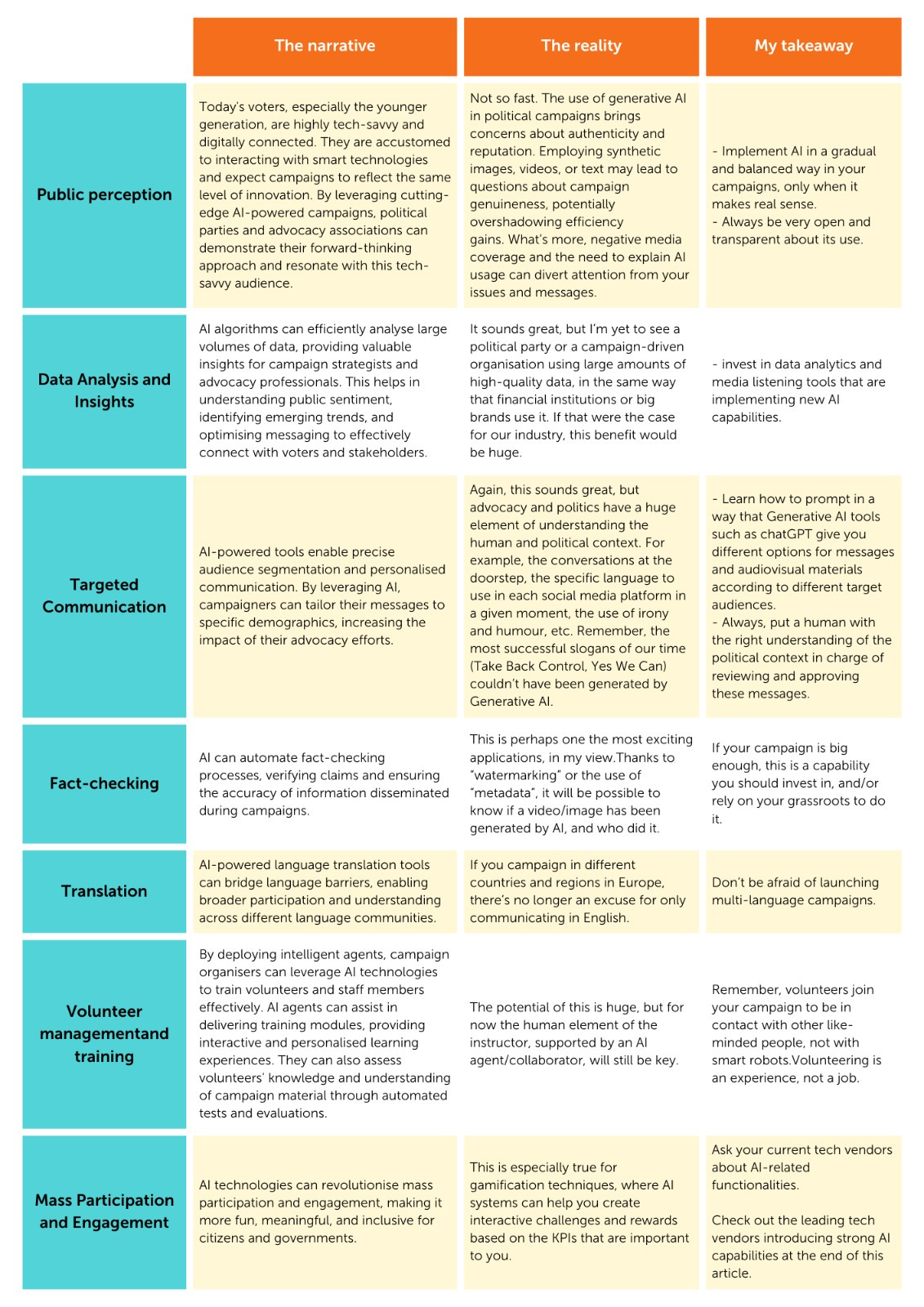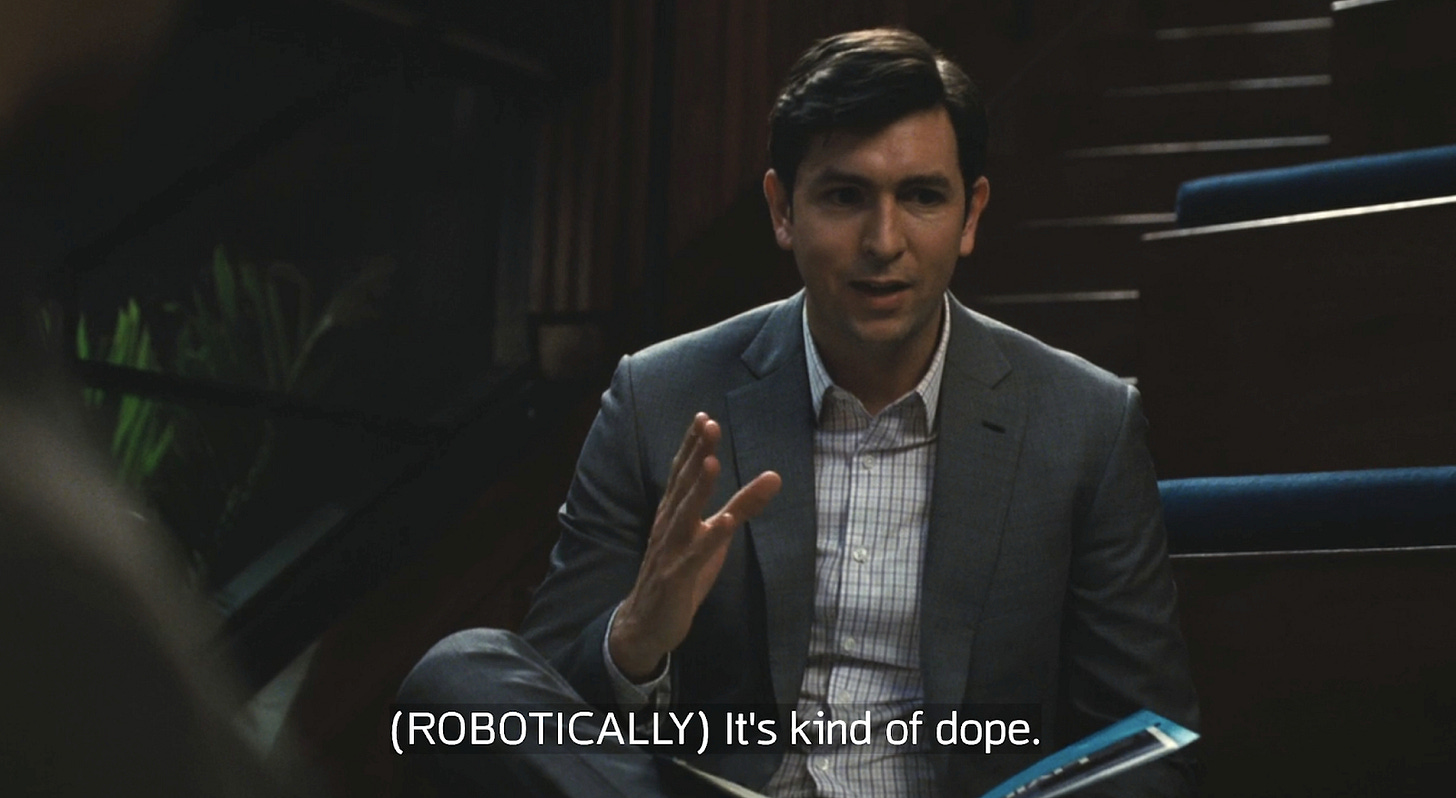This month’s edition is on how artificial intelligence (AI) is transforming campaigns - and there’s no better man to walk us through it than Sebastián Rodríguez. He’s someone I have often drawn on for expertise and inspiration, so I’m delighted he’s agreed to contribute.
Sebastián is a campaigning veteran in politics, nonprofits and the private sector. He works at the nexus of technology, strategy and community. He founded and manages the europeancampaignplaybook, a community of pro-European campaigns, communications and public affairs professionals connecting and pooling knowledge - and unsurprisingly AI has been on high their agenda these days.
If you want to follow up on the content of this newsletter or if you’re into EU campaigning, you should connect with Sebastián - you can get him on LinkedIn, Twitter or through the europeancampaignplaybook website.
So - is AI good news or bad news?
If you work in campaigns, communications and advocacy, you’re probably thinking a lot about AI these days. Products like ChatGPT and other generative AI (i.e. tools that create a variety of data - images, videos, audio, text, 3D models) are already reshaping our business at almost every level.
So how should we think about these changes? There are obvious benefits, saving us time and resources that can be spent on more strategic thinking and reflection. However, there are also tensions and concerns. Most recently we have seen these tools used in ethically questionable ways in last Sunday’s Turkey election campaign.
In this article I will share my personal approach to AI. It’s not perfect, and it will surely evolve, but it’s helping me navigate the current upheaval and I hope it will help you too.
General AI Vs Generative AI
There are two broad buckets for AI concepts - and I find it helpful to separate them out.
In the first bucket, we have “General AI” - this is the holy grail of AI research. It’s the attempt to create intelligent systems to outperform humans in a range of cognitive tasks. This is the one which poses all the terrifying questions about the future of humanity - and to be clear: this does not exist (yet - lots of clever people are working on it).
We should not mix the General AI concept up with what we are dealing with in our day-to-day work right now - Generative AI.
Generative AI is already everywhere. It is behind facial recognition, self-driving cars and personalised internet searches. I picture its newer iterations, like ChatGPT, as collaborators by my side. It can generate content, offer fresh ideas and engage in meaningful conversations - and it can achieve remarkable feats in the context of campaigns.
So how can I use this to make my job easier?
Talking about AI, like any new tech, is a delicate balance. You have to tread the line between highlighting the great possibilities, while avoiding overpromising or coming across as an AI charlatan (a.k.a. going full crypto bro).
Below I share my “AI cheat sheet” - a snapshot into my current state of thinking on AI. It evolves daily and is the basis I use for conversations, research and learning - so if you have a view or reaction, please get in touch and let me know (see caption for link to PDF)!
Further reading (or: what smarter people than me are saying)
The team at Future Life Institute has been collecting signatures to pause “giant” AI developments.
Ned Howey, CEO of Tectonica, the thought-leaders in digital organising encourages a reconnection with the underlying values of transformational organising.
María Linkova-Nijs, Director of Communications at Cefic, talks about how there are “three buckets of concern” when it comes to AI application.
Kristian Gillies, Director at For Purpose & Board Member at SEANZ, on a future where we can’t trust what we see or hear.
Democracy Technologies Report 2023 to get an overview of the trends in the products and functionalities demanded in the civicTech space. More specifically, to understand what problems AI can address.
Organizing is Needed More Than Ever in the Age of AI, by Ned Howey, to come to the conclusion that the response cannot (only) be a centralised one from the public authorities, but a decentralised one, starting with local communities, and then building from the bottom up.
AI principles, to understand what the leading scientists and leaders in the field of AI are endorsing.
To read about early use cases for AI in politics & campaigns, read this report by Higher Grounds Labs, a start-up accelerator and venture fund specialised in campaign and civic technology.
To have a more complete view about whether political campaigns will use AI, read this blog post by Who Targets Me, the go-to people for advertising technology in politics.
And listen to this interview with Sundar Pichai, CEO of Google and Alphabet, in the latest HBR IdeaCast episode, to understand how he is thinking about Generative AI.










Thanks for sharing, Sebastian. Some food for thought:
- The differentiation between 'general' and 'generative' is a bit confusing. In this article, you're talking about machine learning algorithms being used to generate, and you're right, this is not 'true' AI in the sense it is not self-aware. The phrase 'generative AI' has started to pop up more and more, but imho this is branding, and over-stating capabilities. I've not previously seen it used to describe non-artistic machine-learning driven functions such as self-driving cars. Would it perhaps be of benefit to use 'generative ML' or 'generative AI' to describe only those items that are being generated--art, text, etc--through the smooshing-together of existing artworks or texts? That makes it easier to understand why artists and writers are outraged--because it is their work that is being used and combined to create 'new' works, hence the call for IP law updates and for payment. That's the kind of thing that could prove a risk for those using generative tools such as chatGPT or DALL-E for campaigns purposes.
- I find it really interesting that gen Z have lower tech skills than gen Y; they're digital natives, but not digitally proficient. I personally wonder how this will influence uptake of generated content, as if the technically understanding of how content is created is not there, what basis for critique? It's certainly something to mull over!
- To targeted communication and campaign slogans, this is something chatGPT does pretty well. I just asked it to "Pretend that a referendum has been announced to decide whether Australia leaves the Commonwealth and becomes an independent country. Generate 5 slogans FOR independence and 5 slogans AGAINST it."
Does it know that "A New Chapter Begins" is super-lame? No. Or that "Australia Unleashed" sounds a bit violent/dramatic? Probably not. But "Our time, our nation" is just the kind of thing that you could imagine a campaigns team throwing into the mix. In the slogans against independence, the diametric opposite of that slogan was "Common goals, common ground"--less compelling, but you can see the focus on commonality in the face of disruption, and this was just one example it gave.
- Perhaps you could explain in further detail the difference between auto-translation we already have and how you see machine learning assisting this for campaigns purposes?
- How do you see AI technologies revolutionising mass participation and engagement in a positive way (fun, meaningful, inclusive), in light of research indicating that it is more likely to create divisive, exclusive, radicalising content?